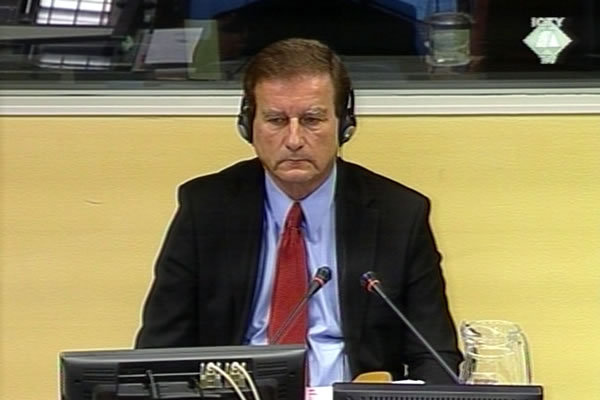Home
SPECIAL POLICE OR CAR MECHANICS?
The prosecution has been trying to prove that photos taken in Gracac immediately after Operation Storm clearly show the Croatian special police stealing cars belonging to the Serbs who had fled the region. Davorin Pavlovic, Markac’s defense witness, denied this, saying that the special police only ‘removed’ the broken-down cars from roads and checked them for booby-traps. General Markac was known to ‘shed a tear’, Pavlovic says
 Davorin Pavlović, svjedok odbrane Mladena Markača
Davorin Pavlović, svjedok odbrane Mladena Markača Finishing his examination-in chief, retired police colonel Davorin Pavlovic answered some questions about the character of the former Croatian special police commander Mladen Markac. Pavlovic is testifying in The Hague as Markac’s defense witness. According to Pavlovic, Markac is ‘a person of high moral standards’ who looked after civilians regardless of their ethnic background. Markac was sensitive to human suffering, the witness added, and on many occasions he saw Markac ‘shedding a tear’ when he met the mothers of Croatian fighters killed in action. In the summer of 1995, during and after Operation Storm, Pavlovic was Markac’s assistant for communications. Generals Gotovina, Cermak and Markac are on trial for crimes against Serbs during and after Operation Storm.
In the cross-examination, the prosecution focused mainly on the events in Gracac. The Croatian special police entered Gracac on 5 August 1995. Three days later, the journalists of the Belgian magazine Standard visited the town in Lika and took photos. Some photos show police officers taking goods out of the houses and loading them onto trucks. On other photos, police officers are jumpstarting civilian cars and later painting the name of their unit – Delta – on the vehicles. Since yesterday Pavlovic denied that these men were looting in Gracac, today the prosecutor showed him the photos again.
The insignia on the sleeve of the man on the photo seen jumpstarting the car could lead to a conclusion that he was a member of the special police, the witness admitted. The witness supposed that the man was ordered to drive the vehicle to site where abandoned goods were stored. As the man didn’t have the keys for the car, he was forced to start it ‘the only way he could’, Pavlovic explained. At first the witness was not able to tell where the warehouse was, only to recall a bit later that it was on a farm behind a local school. Asked to clarify this inconsistency, the witness said it was a long time ago. He had trouble remembering many events but then ‘an image would appear’, the witness said.
The witness had claimed that ‘broken-down’ vehicles were driven away because they blocked the passage for the Croatian special police. This prompted the prosecutor to show the witness a photo with a car parked in front of a house; it was clearly not in anybody’s way. ‘That’s your assumption, which is as good as mine’, Pavlovic replied. The prosecutor asked why the member of a crack police unit ended up doing such menial tasks as removing vehicles. At first the witness said he didn’t know, but in his re-examination he agreed with the defense counsel’s suggestion that the special police were given that task for security reasons. The Croatian special police had engineering training, and cars could have been booby-trapped by the enemy before their retreat, Pavlovic explained.
The trial of the Croatian generals continues next Monday. Markac’s defense will call its next witness.
Linked Reports
- Case : Gotovina et al. - "Operation Storm"
- 2009-11-25 FOLLOWING THE CROATIAN SPECIAL POLICE
- 2009-11-24 HOW MANY SERBS LEFT KRAJINA?
- 2009-11-23 SERBS COULD RETURN THREE YEARS AFTER OPERATION STORM
- 2009-11-30 WHO KILLED THE OLD PEOPLE IN GRUBORI?
- 2009-12-01 POLICEMAN BLAMES THE ARMY
- 2009-12-08 SKABRNJA AS ‘EXAMPLE’ FOR CROATIAN VILLAGES IN KRAJINA
